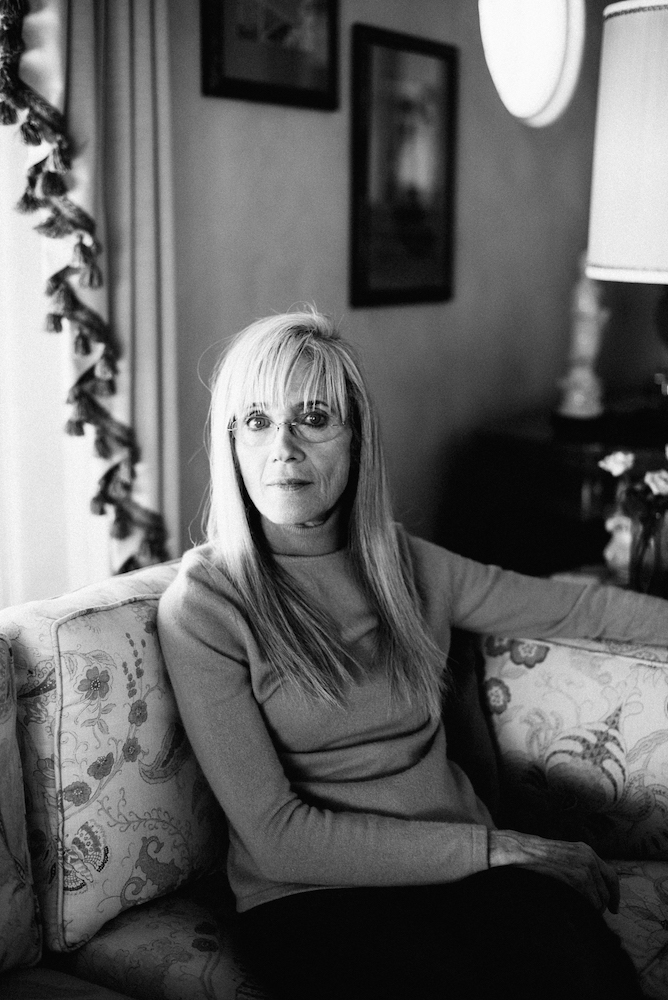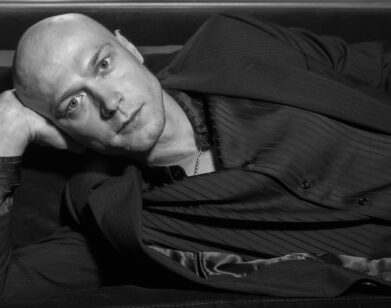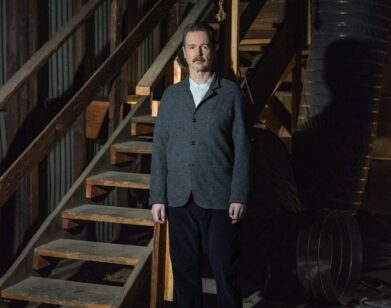The Cult of Stephanie Rothman
STEPHANIE ROTHMAN AT HER HOME IN SHERMAN OAKS, CALIFORNIA, FEBRUARY 2016. PORTRAIT: CARA ROBBINS. HAIR: STEPHEN LEWIS/EXCLUSIVE ARTISTS MANAGEMENT USING R+CO HAIR CARE AND T3 TOOLS.
“Four girls on their own. Once you’ve met them, you’ll never forget them,” so intones the gravelly voiceover in the trailer for Stephanie Rothman’s The Student Nurses. When Rothman unleashed the film in 1970, under the aegis of B-movie king Roger Corman‘s New World Pictures, she was a lone woman in a club of male directors crafting low-budget, drive-in fare when what was produced outside the mainstream was designed for lurid titillation. The term exploitation wasn’t popularized quite yet, but the range of camp shoot-’em-up skin flicks, revenge sagas, demented and implausible horror, and plots that hinged on fetishizing strategically-clad biker women, space women, and prison women; women-on-the-edge and on-the-lam; nurses, vampires, and specimens of half-woman-half-beast; sensationalized midcentury America’s unspoken desires to carnal extremes.
Rothman was the first woman awarded the Director’s Guild of America fellowship while studying film at the University of Southern California, and broke into the business after Corman recruited her to be his assistant at American International Pictures. Her solo directorial debut, a musical beach-blanket romp spiked with feminist subtext, It’s A Bikini World [1967], was an early indicator of the style that would come to define Rothman’s later work, including Nurses: a bait-and-switch of the traditional exploitation formula, stacked with fleshed-out characters, topical social consciousness, and an uncompromising feminist agenda.
This Friday, more than four decades after the release of The Student Nurses, Metrograph will premiere a new 35mm print of the film for a weeklong run with support from the Women’s Film Preservation Fund and Cinema Conservancy. An ensemble piece following four young women about to graduate from nursing school, The Student Nurses candidly navigates both quotidian and heavy-hitting issues, from sex and career to drug use, racial privilege, and abortion. Rothman was a skilled operator turning out the genre from the inside, packaging subversive content into movies that marketed themselves solely on the promise of nudity and violence. Her talents for frame and form (her surreal desert dream sequences in 1971’s cult hit The Velvet Vampire construct hallucinogenic tableaux on par with Magritte), announced her as an unusually gifted image-maker.
But Rothman’s promise was halted, frustratingly so, by a male-run industry unconvinced of female talent. Many of the directors who cut their teeth at Corman’s image factory, be it Martin Scorsese, Jonathan Demme, or Francis Ford Coppola, leveled up to mainstream Hollywood success and auteurist bona fides. But Rothman stalled with her final directorial credit, another exploitation picture, The Working Girls, which was released in 1974. It’s not as if she wasn’t taking meetings with major studios, spearheading writing projects, or considering working in Europe. She was. The Hollywood system as it was, and as it still is to a certain extent today, failed her.
Today, Rothman lives in Los Angeles, which is where we called her up last month to discuss Nurses and her career. Rothman’s prodigious talent and limited oeuvre raise many questions; we can only imagine what an independent Stephanie Rothman vehicle, written and directed on her own terms, would be. Our wager? It would be something to talk about.
COLLEEN KELSEY: I was curious about how you came to filmmaking. When did you realize that making movies was what you were going to pursue?
STEPHANIE ROTHMAN: It’s when I saw what is still my favorite film of all time, Ingmar Bergman’s The Seventh Seal [1957]. I didn’t, at that point, know how to become a filmmaker. I didn’t even think it was possible. When I saw it I thought to myself, “This is what I would like to do. I would like to make a film like this.” Highly thoughtful, European-like, [laughs] small films. I wanted to be a writer-director.
KELSEY: I know you won the Director’s Guild of America fellowship prize and Roger Corman hired you as his assistant. What was the first film that you worked on with Corman?
ROTHMAN: At first he had me shooting several second unit segments of other films. Then he had me take a film that he financed of which there were two versions, which he was unsatisfied with: one was shot in Europe and the other was shot here in the United States, and had me weave a story that would integrate these two versions together. So that’s what I did, and I went down and I shot about another 30 minutes of original footage and it was made into what I can only call…a mish-mosh. [laughs] Unintended joint collaboration would be a more accurate way of putting it. [laughs]
KELSEY: Corman is known for a very particular way of production. What did you learn from working with him?
ROTHMAN: What I learned was, first of all, how to work fast, which was very important because that’s how money was saved. He was very helpful in showing me how to do that effectively. He was also, I might add, very encouraging to me. Roger was one of the two people, I can say, in my life, who was a mentor to me. The other was the chairman of the film school I went to, the cinema department at USC. His name was Bernard Cantor.
KELSEY: The Student Nurses was one of the first films for New World Pictures. Where did the idea originate for the script?
ROTHMAN: Well, that’s very fascinating. [laughs] The subject for Student Nurses was suggested by independent regional film sub-distributors who co-invested with Roger in the film. The sub-distributors had recently had success with a R-rated film about a babysitter, which had more nudity than audiences could see in films made by major studios. At that time, it was believed by the purveyors of male fantasies in films that nurses were a popular male fantasy because they were caring, and they were women who could legitimately touch men all over. [chuckles] So they requested a film be made about very pretty student nurses with as much nudity as an R-rated film could have.
KELSEY: So how did you build out the rest of the narrative from that salient idea?
ROTHMAN: [laughs] Very well put. Well, Roger asked the film’s producer, Charles Swartz, who was my husband, and me to make the film. The sub-distributors’ requirements were the only ones he gave us. Beyond that, he gave us freedom to do what we liked. The result was a film that included the sub-distributors’ requirements, but much more. I’ve always been interested in the social conflict of my age, my own time, as well as the result of positive and negative of social change, and the ongoing quest we all have, from the cradle to the grave, for identity.
So the film has all those themes woven into it. First of all, it covers the last few months of nursing school, the main characters and what happens to them, and what changes them for better or worse. They deal with, I must emphasize, unromanticized sexual assault, attachment to a patient with a terminal illness who dies, a street riot by an aspiring minority group, lack of adequate healthcare for the poor, abortion, the results of taking LSD, and the seemingly never-ending consequences, at that time, of the Vietnam War. So, it was packed with content.
KELSEY: Correct me if I’m wrong, but when you were making this movie, or previous low-budget films, had the idea of quote un-quote, exploitation films as a genre come to the fore yet? Or were these films just considered to be low-budget?
ROTHMAN: Well, I naively thought I was making a low-budget movie. But, when the film came out, the Daily Variety reviewer at that time who was named Art Murphy described it as an exploitation film. I had never heard that term before. Roger never used it. So that’s how I learned that I had made an exploitation film. Then I went and did some research to find out exactly what exploitation films were, their history and so forth, and then I knew that’s what I was doing, because I was making low-budget films that were transgressive in that they showed more extreme things than what would be shown in a studio film, and whose success depended on their advertising, because they had no stars in them. It was dismaying to me, but at the same time I decided to make the best exploitation films I could. If that was going to be my lot, then that’s what I was going to try and do with it.
KELSEY: How these films are packaged, whether it’s the trailer or the posters, the exploitation elements of them—which, more often than not, happen to be objectification of women, nudity, violence, etc.—are the alluring details that draw people in. But at the same time, you were able to use the openness of the framework to pack The Student Nurses and the other films you’ve made with ethically or ideologically progressive themes. Do you think that the majority of filmgoers who went to go see The Student Nurses or other films were surprised with what they ended up seeing?
ROTHMAN: Yes, actually. The responses I got, or the limited responses I got, because the films played all over and I just saw them in a few venues, was that people were surprised, but they also responded favorably. They liked it.
KELSEY: Was working within the prescribed constraints of nudity or violence ever problematic for you? Did you ever have to sneak in certain sequences or include certain things that maybe the narrative wouldn’t have allowed?
ROTHMAN: When the scripts were written it was built in. Was I thrilled with doing that? Usually not. But that’s what was required, so that’s what I did. Now, of course, in a film like Terminal Island [1973], practically the whole film involves violence because the subject matter is violent people. I accepted that. I recognized that if I was going to make films, and I was going to make them for the market, I was making them for it. I wanted to make films very much and that’s what I needed to do. What I needed to do was try to refine that and give it some meaning beyond the violence itself, or beyond the nudity itself. In that sense, I tried very hard to not make it exploitative.
KELSEY: Was the activism of the time period, second wave feminism, civil rights, anti-war, etc., especially relevant?
ROTHMAN: If I wasn’t conscious of them, they wouldn’t have occurred in my films. I was very conscious of them and I was very interested in them. I wanted to have a conversation with a wider audience who might not encounter these ideas at all, or might encounter them in a very narrow and stereotypical form. I wanted to open their minds as best as I could.
KELSEY: What made you decide to stop working with Roger and transition out of New World Pictures?
ROTHMAN: He wouldn’t pay me anything. [laughs] No, he paid people very little and [Charles and I] had to make a living. We were offered better pay at Dimension Pictures, so we left for Dimension. The pull for that was economic. It was not ideological. Roger is ideologically quite progressive, but when it comes to money he is much more cautious. Let’s put it tactfully that way.
KELSEY: You eventually transitioned out of working in film, but were there moments where you did try to move out of the exploitation genre?
ROTHMAN: Yes, I tried, but I failed.
KELSEY: What was your experience trying to get other work?
ROTHMAN: Well, first of all, I couldn’t get any work in television. No one would even meet me, and I had very good agents. When it came to feature films, I was once invited by an executive at MGM to go and meet her, which was in the days when there were very few female filmmakers at all. I went and met her and she said to me, “We were in a story meeting yesterday. We’re getting a new script ready for a first time director who we want to use and we were talking about the fact that we would like it to be a vampire film. Something, you know, like The Velvet Vampire that Stephanie Rothman made.” My response when I heard that was, “Well, if you want a vampire film like Stephanie Rothman made, why don’t you get Stephanie Rothman?”
KELSEY: New audiences are finding these films. What is it like for you to go back and watch a film like The Student Nurses?
ROTHMAN: Well, it’s like visiting an old friend. I feel a mixture of, how shall I put it? Satisfaction and regret. Regret that I couldn’t have made more films. Regret that I couldn’t have made films that gave me a larger platform unto which to work in terms of finances, in terms of not having certain obligations to a certain kind of audience, to just to make a film that was dear to my heart in every respect. Not that the films I made don’t have aspects that are very dear to my heart, I mean, they’re not the complete films I would have liked to have made.
THE STUDENT NURSES RUNS FROM THIS FRIDAY, MARCH 11 TO MARCH 17 AT METROGRAPH, 7 LUDLOW STREET. STEPHANIE ROTHMAN WILL APPEAR IN PERSON ON MARCH 11 FOR THE 7 PM SHOW.







